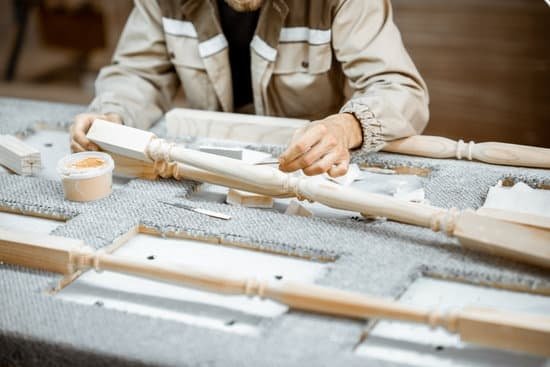Are you interested in learning woodworking skills? Woodworking is an ancient craft that involves shaping and creating items from wood, and it’s a skill that can be both practical and rewarding. Whether you’re looking to create your own furniture, tackle DIY projects, or simply learn a new hobby, mastering woodworking skills can open up a world of possibilities.
Woodworking is not only about working with wood; it also requires knowledge of various tools, techniques, and safety measures. In this article, we will explore the art of woodworking, the benefits of learning woodworking skills, essential tools and materials for getting started, basic techniques for beginners, safety tips, advanced skills to master, online resources and workshops for learning woodworking, and finally showcasing your woodworking projects.
Whether you’re a complete novice or have some experience with woodworking, there’s always something new to learn about this timeless craft. So let’s dive into the world of woodworking and explore the opportunities that come with honing your skills in this traditional artform.
The Benefits of Learning Woodworking Skills
Woodworking is a timeless craft that offers a wide range of benefits to those who choose to learn and master the skills involved. From the satisfaction of creating something with your own hands to the mental and emotional rewards of working with wood, there are numerous reasons to embark on a woodworking journey.
Physical and Mental Well-Being
Learning woodworking skills can have a positive impact on both physical and mental well-being. Engaging in woodworking activities requires physical exertion, which can help improve overall fitness levels. Whether it’s sawing, planing, or sanding, the movements involved in woodworking can provide a good workout for various muscle groups. Additionally, the focus and concentration required for woodworking can also contribute to improved mental acuity and cognitive function.
Creative Expression and Personal Fulfillment
One of the most satisfying aspects of learning woodworking skills is the opportunity for creative expression. As you gain proficiency in woodworking techniques, you’ll be able to bring your design ideas to life, whether it’s crafting furniture, decorative items, or more complex projects. The act of creating something unique with your hands can be incredibly fulfilling and offer a sense of accomplishment that is unmatched by many other activities.
Skill Development and Problem-Solving
Woodworking provides an excellent platform for skill development and problem-solving. As you progress in learning woodworking skills, you’ll build a foundation of knowledge in areas such as measurement, tool usage, joinery techniques, and wood selection. Additionally, woodworking often presents challenges that require critical thinking and problem-solving abilities. Overcoming these challenges not only helps in mastering specific woodworking tasks but also contributes to honing important life skills that can be applied beyond the workshop.
Getting Started
Woodworking is a craft that requires the right tools and materials to get started. Whether you are interested in creating small wooden crafts or large furniture pieces, having the essential tools will set you up for success. Here are some of the basic tools and materials that every aspiring woodworker should have in their workshop:
- Measuring Tools: A tape measure, combination square, and marking gauge are essential for accurately measuring and marking wood.
- Cutting Tools: A saw is a must-have tool for any woodworker. A handsaw or a power saw, such as a table saw or circular saw, can be used to make straight cuts in wood.
- Joinery Tools: Chisels, a mallet, and a hand plane are necessary for creating joints and smoothing out rough surfaces.
- Sanding Tools: Sandpaper in various grits and sanding blocks are needed to smooth out rough edges and surfaces.
- Finishing Materials: Wood glue, screws, nails, and finishing products such as varnish or paint are essential for assembling and adding the finishing touches to woodworking projects.
In addition to these tools and materials, it’s important to have a dedicated workspace with proper ventilation and lighting. A sturdy workbench or table is also essential for working on your projects safely. Investing in high-quality tools and materials will not only make the learning woodworking skills more enjoyable but will also ensure that your finished projects look professional.
As you embark on your journey of learning woodworking skills, it’s important to remember that safety should always be a top priority when working with wood. Wearing appropriate safety gear such as goggles, hearing protection, and dust masks is crucial.
Additionally, understanding how to use each tool safely and correctly can help prevent accidents. By equipping yourself with the right tools and materials while practicing safety precautions, you’ll soon find yourself well on your way to mastering the craft of woodworking.
Basic Woodworking Techniques for Beginners
So, you’ve decided to embark on the journey of learning woodworking skills. Congratulations. Whether you’re aiming to craft your own furniture or simply develop a new hobby, mastering basic woodworking techniques is an essential starting point. Here are some fundamental skills and techniques that every beginner woodworker should learn:
- Measuring and Marking: Accurate measurements and markings are crucial for any woodworking project. Invest in a high-quality measuring tape, combination square, and marking tools to ensure precision.
- Cutting and Shaping: Understanding different cutting techniques using hand saws, jigsaws, or circular saws is essential. Additionally, learning how to properly use chisels and hand planes for shaping wood can greatly enhance your woodworking abilities.
- Joinery: Mastering basic joinery techniques like butt joints, miter joints, and pocket hole joinery will enable you to assemble your wooden pieces with strength and stability.
These fundamental woodworking techniques serve as the building blocks for more advanced projects down the line. Be patient with yourself as you practice these skills, as they require time and dedication to master. As you familiarize yourself with these techniques, don’t forget to prioritize safety by wearing appropriate protective gear such as safety goggles and ear protection.
Remember that every expert was once a beginner. Embrace the learning process, take pride in your progress, and enjoy the fulfilling experience of bringing your woodworking projects to life. Happy crafting.
Safety Tips for Woodworking
Woodworking can be an incredibly rewarding and fulfilling hobby, allowing individuals to create beautiful and functional pieces of art with their own hands. However, it’s important to prioritize safety when learning woodworking skills. Whether you’re a beginner or an experienced woodworker, following the necessary safety precautions is crucial to prevent accidents and injuries in the workshop.
One of the most important safety tips for woodworking is to always wear the appropriate personal protective equipment (PPE). This includes safety goggles to protect your eyes from flying debris, hearing protection to guard against loud tools, and a dust mask to prevent inhalation of sawdust and other particles. Additionally, wearing proper clothing that covers your skin and avoiding loose clothing that could get caught in machinery is essential for workshop safety.
Another vital aspect of woodworking safety is understanding how to use and maintain tools properly. It’s crucial to ensure that all power tools are in good working condition, with sharp blades or bits, and that hand tools are kept clean and sharp. Proper tool handling, such as maintaining a secure grip on handheld power tools and using push sticks for table saws, can also help prevent accidents while woodworking.
Lastly, creating a well-organized and clutter-free workspace is key to staying safe while woodworking. Keeping the workshop clean and free from obstructions reduces the risk of tripping hazards and improves overall efficiency.
It’s also important to have a fire extinguisher readily available in case of emergencies, as well as a first aid kit for any minor injuries that may occur during woodworking projects. By prioritizing safety in the workshop, woodworkers can focus on honing their skills and enjoying their craft without unnecessary risks.
Advanced Woodworking Skills to Master
Once you have mastered the basic woodworking techniques, it’s time to move on to more advanced skills that will take your craft to the next level. One of the key advanced skills to master in woodworking is joinery. Joinery involves creating strong and seamless connections between wood pieces, and there are various techniques such as dovetail joints, mortise and tenon joints, and lap joints that you can learn.
Another important skill to advance in woodworking is carving. Whether it’s intricate designs on furniture or decorative wooden art pieces, carving adds a beautiful touch to woodworking projects. There are different types of wood carving techniques such as relief carving, chip carving, and whittling, each requiring precision and patience.
Additionally, mastering the art of wood finishing is crucial for elevating the quality of your projects. Learning how to properly stain, seal, and varnish wood can make all the difference in achieving a professional-looking finish. Understanding different types of wood finishes and their applications will help you enhance the natural beauty of the wood while also protecting it from wear and tear over time.
One thing about these advanced woodworking skills is that they require dedication, practice, and a willingness to learn from your mistakes. While they may seem daunting at first, with perseverance and guidance from experienced woodworkers, you’ll soon find yourself creating stunning pieces that truly showcase your mastery of the craft.
| Woodworking Skill | Description |
|---|---|
| Joinery | Creating strong connections between wood pieces using techniques like dovetail joints and mortise and tenon joints. |
| Carving | Using different techniques such as relief carving or whittling to add intricate designs or details to wooden projects. |
| Wood Finishing | Learning how to properly stain, seal, and varnish wood for a professional-looking finish that enhances its natural beauty. |
Learning Woodworking Skills
Online Resources
One of the most convenient ways to learn woodworking skills is through online resources such as instructional videos, tutorials, and articles. Websites like YouTube, Woodworking Network, and Popular Woodworking Magazine offer a wide range of content designed to guide individuals through various projects and techniques. These resources not only provide step-by-step instructions but also valuable tips and tricks from seasoned woodworkers that can help learners improve their craftsmanship.
Workshops
For those who prefer a more hands-on approach to learning woodworking skills, workshops conducted by expert woodworkers can be incredibly beneficial. These workshops often take place in person or virtually, allowing participants to interact with instructors and fellow enthusiasts while gaining practical experience in different aspects of woodworking. Workshops may cover topics such as joinery techniques, furniture making, or carving, providing attendees with the opportunity to refine their skills under the guidance of knowledgeable professionals.
Online Courses
In addition to free resources and workshops, there are also structured online courses available for individuals seeking comprehensive training in woodworking. Platforms like Udemy, Skillshare, and The Woodworker’s Guild of America offer a variety of courses tailored to different skill levels, from beginner basics to advanced techniques. These courses typically include video lessons, interactive assignments, and community forums where students can seek advice and feedback from instructors and peers as they progress in their learning journey.
The availability of these online resources and workshops makes it easier than ever for anyone interested in learning woodworking skills to access valuable knowledge and guidance. Whether you’re honing your abilities as a hobbyist or aspiring to become a professional woodworker, taking advantage of these digital tools can significantly contribute to your growth and proficiency in this timeless craft.
The Joy of Creating
Woodworking is not just about creating beautiful and functional pieces, it’s also about the joy of showcasing your projects. Whether you are a beginner or an experienced woodworker, displaying your creations can bring a sense of accomplishment and pride. From small DIY projects to intricate furniture pieces, sharing your woodworking projects with others can be incredibly rewarding.
One of the best ways to showcase your woodworking projects is by creating a portfolio or gallery of your work. This can be done through a personal website, social media platforms, or even local exhibitions and craft fairs. By documenting and sharing photos of your creations, you can inspire others and attract potential clients or customers who are interested in purchasing your work.
In addition to traditional methods of showcasing woodworking projects, the digital age has opened up new opportunities for woodworkers to share their work online. Platforms such as Instagram, Pinterest, and Etsy allow woodworkers to reach a wider audience and connect with fellow craftsmen from around the world. This not only provides exposure for your projects but also opens up possibilities for collaborations and networking within the woodworking community.
| Woodworking Projects | Showcasing Methods |
|---|---|
| Custom Furniture | Personal Website/Social Media |
| Small DIY Creations | Craft Fairs/Exhibitions |
| Wooden Art Pieces | Online Platforms (Instagram, Etsy) |
Conclusion
Learning woodworking skills can be a rewarding and fulfilling experience for individuals of all ages. From the joy of creating something with your own hands to the mental and physical benefits of working with wood, there are numerous advantages to embracing the craft of woodworking. Whether you are a beginner just starting out or an experienced woodworker looking to refine your skills, the journey of learning woodworking skills is one that offers continuous growth and satisfaction.
By acquiring essential tools and materials, as well as mastering basic woodworking techniques, individuals can lay a strong foundation for their woodworking journey. Additionally, prioritizing safety in the workshop is paramount to ensure a positive and secure woodworking experience. As woodworkers advance in their craft, they have the opportunity to explore more advanced skills and techniques to further enhance their projects and expand their creativity.
For those interested in learning woodworking skills, there are various online resources and workshops available to provide guidance and instruction. These platforms offer valuable insights from experienced woodworkers, allowing individuals to learn at their own pace and connect with a community of fellow enthusiasts.
Ultimately, embracing the craft of woodworking not only allows for the creation of beautiful and functional pieces but also fosters a sense of accomplishment and pride in one’s abilities. Whether it’s building furniture, crafting intricate designs, or simply honing your skills, learning woodworking is an enriching pursuit that offers endless opportunities for growth and creativity.
Frequently Asked Questions
Can I Teach Myself Woodworking?
Yes, it is possible to teach yourself woodworking. There are plenty of resources available, such as books, online tutorials, and classes. It will require patience, practice, and dedication to develop your skills.
How Do I Get Into Woodworking With No Experience?
Getting into woodworking with no experience can be intimidating, but it’s definitely achievable. Start by familiarizing yourself with basic tools and techniques. Consider taking a beginner’s class or finding a mentor to learn from.
How Do I Become a Skilled Woodworker?
To become a skilled woodworker, it’s important to continuously practice and refine your skills. This includes mastering different joinery techniques, understanding wood characteristics, and learning how to use various tools safely and effectively. Continuous learning through books, videos, and workshops can also contribute to improving your skills.

Hi everyone! I’m a woodworker and blogger, and this is my woodworking blog. In my blog, I share tips and tricks for woodworkers of all skill levels, as well as project ideas that you can try yourself.





